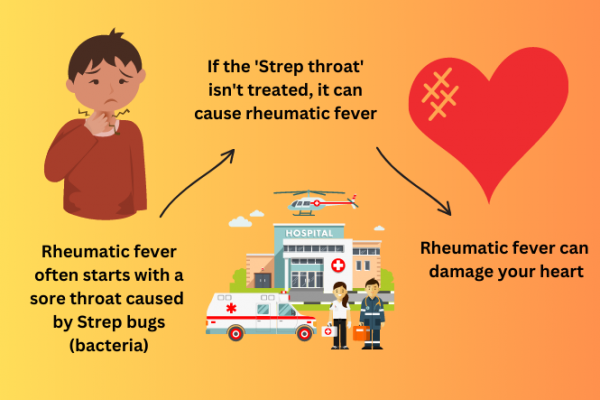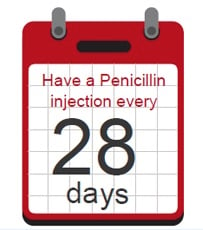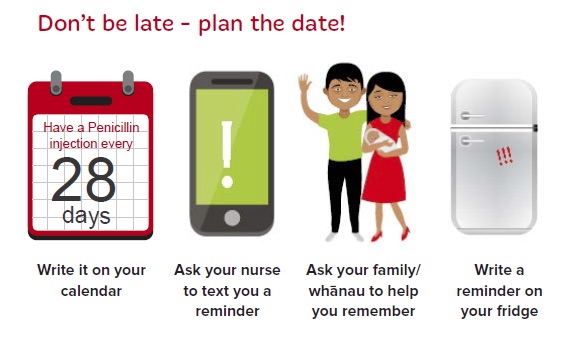You can now add Healthify as a preferred source on Google. Click here to see us when you search Google.
Rheumatic fever in children
Key points about rheumatic fever
- Rheumatic fever is a serious illness.
- It often starts with a sore throat caused by strep bacteria.
- Without treatment, strep throat can cause rheumatic fever.
- Rheumatic fever can damage your heart – this is called rheumatic heart disease.
- It's very important that your child does not get rheumatic fever if they have already had it.
- The best way to stop your child having another attack of rheumatic fever is to make sure they have their regular penicillin injections on time.
- The content on this page comes from KidsHealth(external link).

Rheumatic fever is a serious illness that can cause damage in your child's heart as well as swelling and pain in their hips, knees, ankles, elbows and wrists. You may also notice a skin rash, fever or jerky movements. Over time, most of these symptoms will go away but any damage to your child's heart may be permanent.
Video: Rheumatic Fever Informative Video
This video may take a few moments to load.
(Stop Sore Throats Hurting Hearts, NZ, 2016)
Rheumatic fever often starts with a sore throat caused by strep bacteria. Without treatment, strep throat can cause rheumatic fever. Rheumatic fever can damage your heart. This is called rheumatic heart disease.

Image credit: Healthify He Puna Waiora, NZ
The heart is a pump with 4 chambers (rooms) and 4 valves. A heart valve acts like a one-way door. It makes sure that blood pumped by the heart flows in one direction only. If rheumatic fever damages the heart valves, this is called rheumatic heart disease.
When your doctor listens to your child's heart, they may hear extra sounds called murmurs. Murmurs are often normal in unwell children but sometimes they can be a sign that blood is flowing the wrong way through a leaky valve.
Video: How rheumatic fever affects the heart
This video may take a few moments to load.
(KidsHealth, NZ, 2018)
Not everyone with rheumatic fever will have heart valve damage, but people with badly damaged heart valves may need heart surgery.
When rheumatic fever damages your child's heart valve, their heart cannot pump properly and they may feel:
- short of breath when lying down flat
- the need to sleep with more pillows
- more short of breath than others when doing the same exercise
- short of breath when doing nothing
- a lack of energy.
What happens in hospital?
During your child’s stay in hospital, they will have many tests. These include blood tests and an echo scan (echocardiogram) to check on your child's heart. The treatment for sore joints is rest and pain relief.
Your child will have penicillin to get rid of the strep bacteria. They will have their first penicillin injection before leaving hospital. Depending on your child’s symptoms and test results, they may need to stay resting in hospital for some weeks or months.
Children with badly damaged heart valves may need heart surgery.
What happens when my child goes home?
|
It is very important that your child doesn't get rheumatic fever again. This can cause more damage to their heart. The best way to prevent rheumatic fever is to make sure your child has their regular penicillin injections on time. |
Your doctors will let you know how long your child needs to rest when they go home. As soon as your doctor says it is safe for your child to be active again, it is important that they start exercising regularly and lead a healthy lifestyle.
With proper care and regular penicillin injections, most people who have had rheumatic fever lead a normal life. Penicillin is the best antibiotic to prevent rheumatic fever. If your child is unable to have penicillin, your doctor will discuss another treatment with you.
It is very important that your child doesn’t get rheumatic fever again. Every strep throat can lead to rheumatic fever, which can cause more damage to their heart.
To stop your child from getting strep throat, which can cause rheumatic fever again, make sure they have their regular penicillin injections. Talk with the nurse about arranging your child’s penicillin injections, to see what may work best for you.
Video: How to protect your heart after rheumatic fever
This video may take a few moments to load.
(KidsHealth, NZ, 2018)
An animated video showing how you can protect your heart after rheumatic fever.
 The best way to prevent rheumatic fever is to make sure your child has their regular penicillin injections on time. Penicillin kills the strep bacteria that trigger rheumatic fever, stopping any further damage to your child’s heart valves.
The best way to prevent rheumatic fever is to make sure your child has their regular penicillin injections on time. Penicillin kills the strep bacteria that trigger rheumatic fever, stopping any further damage to your child’s heart valves.
Your child will have penicillin injections:
- every 28 days
- in a muscle near their bottom or hip
- from your community nurse, district nurse or public health nurse.
Penicillin injections can be painful. Nurses can use numbing medicine (local anaesthetic), distraction techniques and other ways to minimise the pain.
The nurse may come to your home or your school clinic to give the injection. There are also community nurse clinics available.
|
Your child will need a penicillin injection every 28 days. |
Video: Why taking penicillin injections is important for rheumatic fever.
This video may take a few moments to load.
(NZ Kids Health, 2017)
How long will penicillin injections be necessary?
Your child will need to have injections every 28 days for at least 10 years, or until they are 21 years old, whichever is longer. In some cases, particularly if your child has heart valve damage, they may need to continue penicillin injections for longer.
Never stop penicillin treatment without discussing it first with your child’s doctor, as your child could get rheumatic fever again. This can cause more damage to their heart valves. Remember to tell your child’s nurse if you are moving house, going overseas, on holiday or going away. Your child may need to get their injection early, or their nurse may be able to arrange for them to receive their injections elsewhere.
Tips for remembering penicillin injections
- Write it on your calendar.
- Ask your nurse to text you a reminder.
- Ask your family/whānau to help you remember.
- Write a reminder on your fridge.
If you forget an injection, ring your nurse to arrange the next injection as soon as possible.
Tell every doctor, dentist or dental therapist that your child has had rheumatic fever.
Heart valves damaged by rheumatic heart disease can occasionally get infected during certain types of operations and dental work. Your child may need extra antibiotics to help protect their heart. This is why it is important to remember to tell every doctor, dentist or dental therapist that your child has had rheumatic fever before they have any medical procedures or operations.
Ask your doctor for a copy of a rheumatic fever wallet card. It has important information about your child’s rheumatic fever. You should show it to any dentist, dental therapist or doctor before they treat your child.
At the dentist
Everyone has tiny bugs in their mouths. These bugs are usually harmless, but sometimes when the dentist is working on your child’s teeth, the bugs can get into their bloodstream. If they reach your child’s heart, the bugs can cause more damage to the heart valves. This is called endocarditis.
Your child can look after their teeth and help to avoid any infection by:
- having their own toothbrush – don't let them share with anyone
- brushing their teeth twice a day with fluoride toothpaste
- not having sweet food and drinks too often
- having dental checks every 6 months.
Video: How to look after your teeth after rheumatic fever
This video may take a few moments to load.
(NZ Kids Health, 2018)
Common questions about penicillin injections(external link) KidsHealth NZ
Helping to make the penicillin injections more comfortable(external link) KidsHealth NZ
Rheumatic fever care plan(external link) KidsHealth NZ
Rheumatic fever – women and pregnancy(external link) KidsHealth NZ
Rheumatic fever and rheumatic heart disease(external link) Heart Foundation, NZ
The Paediatric Society of New Zealand is grateful to the Heart Foundation for providing the content for this page. The booklet 'Rheumatic fever and rheumatic heart disease'(external link) was revised in July 2019.
The video is copyright Kylie Sullivan 2017. Licensed under a Creative Commons Attribution-ShareAlike 3.0 Unported License. Acknowledgements: Starship Child Health, Starship Foundation, Auckland District Health Board (Alison Leversha, Faith Mahony).
Clinical resources and guidelines
Heart Foundation, NZ
NZ Guidelines for rheumatic fever(external link) Heart Foundation, NZ, 2019
A guide for sore throat management(external link) Heart Foundation, NZ
Guidelines for rheumatic fever – group A streptococcal sore throat management(external link) Heart Foundation, NZ, 2019
Diagnosis, management and secondary prevention of acute rheumatic fever and rheumatic heart disease(external link) Heart Foundation, NZ
Proposed rheumatic fever primary prevention plan – guideline(external link) Heart Foundation, NZ
A guide for the use of echocardiography in acute rheumatic fever(external link) Heart Foundation, NZ, 2015
A guide for the duration of secondary prophylaxis in acute rheumatic fever(external link) Heart Foundation, NZ, 2015
Antibacterial prophylaxis for dental procedures(external link) Heart Foundation, NZ, 2009
NZ Guideline for prevention of infective endocarditis associated with dental and other medical interventions(external link) Heart Foundation, NZ, 2008
Sore throats matter – rheumatic fever teaching units(external link) Heart Foundation, NZ
Health Promotion Agency, NZ
Preventing rheumatic fever(external link) Resources on these webpages were developed for the Rheumatic Fever Awareness Campaigns (2014–2017). They can be used to support regional Rheumatic Fever awareness activities.
Health New Zealand | Te Whatu Ora
Rheumatic fever – part of the Communicable Disease Control Manual(external link) Health New Zealand | Te Whatu Ora
Best Practice Advisory Centre, NZ
Rheumatic fever in Maori - what can we do better?(external link) BPAC, NZ, 2011
Rheumatic fever, the neglected disease(external link) BPAC, NZ, 2010
Identifying the risk of serious illness in children with fever(external link) BPAC, NZ, 2010
Rheumatic fever – the neglected disease(external link) BPAC, NZ, 2010
Pacific Health Review
Pacific Health Review(external link) Focus on rheumatic fever, 2012
Other resources
Anderson, A., Spray, J (2020). Beyond awareness – towards a critically conscious health promotion for rheumatic fever in Aotearoa, NZ [PDF, 833 KB]. Social Science and Medicine https://doi.org/10.1016/j.socscimed.2020.112798
Updated Australian criteria for acute rheumatic fever diagnosis(external link) RHD Australia, 2020
Rheumatic fever – children and adults(external link) Starship Clinical Guidelines, NZ 2021
Continuing professional development
Sore throats and rheumatic fever – Emma Best(external link) Goodfellow Podcast, NZ, 2015
Don't miss that ARF diagnosis(external link) Goodfellow Unit, NZ, 2024
Credits: This content has been collaboratively developed by Health New Zealand | Te Whatu Ora, KidsHealth, and Healthify He Puna Waiora to provide trusted health information.
Last reviewed:






